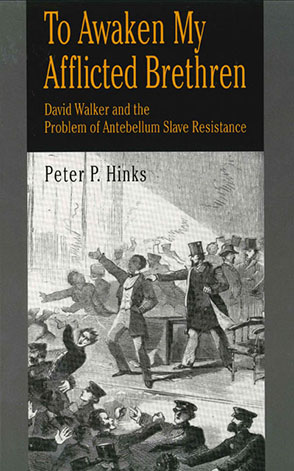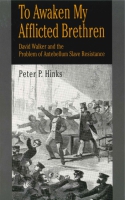
To Awaken My Afflicted Brethren
David Walker and the Problem of Antebellum Slave Resistance
Peter P. Hinks
To Awaken My Afflicted Brethren
David Walker and the Problem of Antebellum Slave Resistance
Peter P. Hinks
“Anyone who assumes that the history of black American politics began with the emergence of Frederick Douglass will be startled by Hinks’s account of David Walker. . . . And anyone interested in the turmoil that brought on the nation’s greatest crisis—or in the enduring legacy of that crisis—will find a great deal to learn in Hinks’s absorbing narrative.”
- Media
- Description
- Reviews
- Bio
- Subjects
Myers Outstanding Book Award Winner for Books Published in 1997 from the Gustavus Myers Center for the Study of Bigotry and Human Rights in North America
Little was formerly known about David Walker's life. Through painstaking research, Hinks has situated Walker much more precisely in the world out of which he arose in early nineteenth-century coastal North and South Carolina. He shows the likely impact of Wilmington's independent black Methodist church upon Walker, the probable sources of his early education, and—most significant—the pivotal influence that Denmark Vesey's Charleston had on his thinking about religion and resistance. Walker's years in Boston from 1825, his mounting involvement with the Northern black reform movement, and the remarkable underground network used to distribute the Appeal, all reconstructed here, testify to Walker's centrality in the development of American abolitionism and antebellum black activism.
Hinks's thorough exegesis of the Appeal illuminates how this document was one of the most startling and incisive indictments of American racism ever written. He shows how Walker labored to harness the optimistic activism of evangelical Christianity and revolutionary republicanism to inspire African Americans to a new sense of personal worth and to their capacity to challenge the ideology and institutions of white supremacy. Yet the failure of Walker's bold and novel formulations to threaten American slavery and racism proved how difficult, if not impossible, it was to orchestrate large-scale and effective slave resistance in antebellum America. To Awaken My Afflicted Brethren fathoms for the first time this complex individual and the ambiguous history surrounding him and his world.
“Anyone who assumes that the history of black American politics began with the emergence of Frederick Douglass will be startled by Hinks’s account of David Walker. . . . And anyone interested in the turmoil that brought on the nation’s greatest crisis—or in the enduring legacy of that crisis—will find a great deal to learn in Hinks’s absorbing narrative.”
“So thorough is Hinks’s research, it is hard to imagine that future scholars will unearth any further documents of critical importance to Walker’s life. . . . Thanks to Peter Hinks’s passionate study, Walker the husband and father and activist will at long last be as familiar as Walker the essayist.”
Peter P. Hinks is Lecturer in American History at Yale University, where he also servers as Associate Editor of The Frederick Douglass Papers. He is the editor of a new edition of An Appeal to the Colored Citizens of the World by David Walker, forthcoming from Penn State Press.
Mailing List
Subscribe to our mailing list and be notified about new titles, journals and catalogs.



